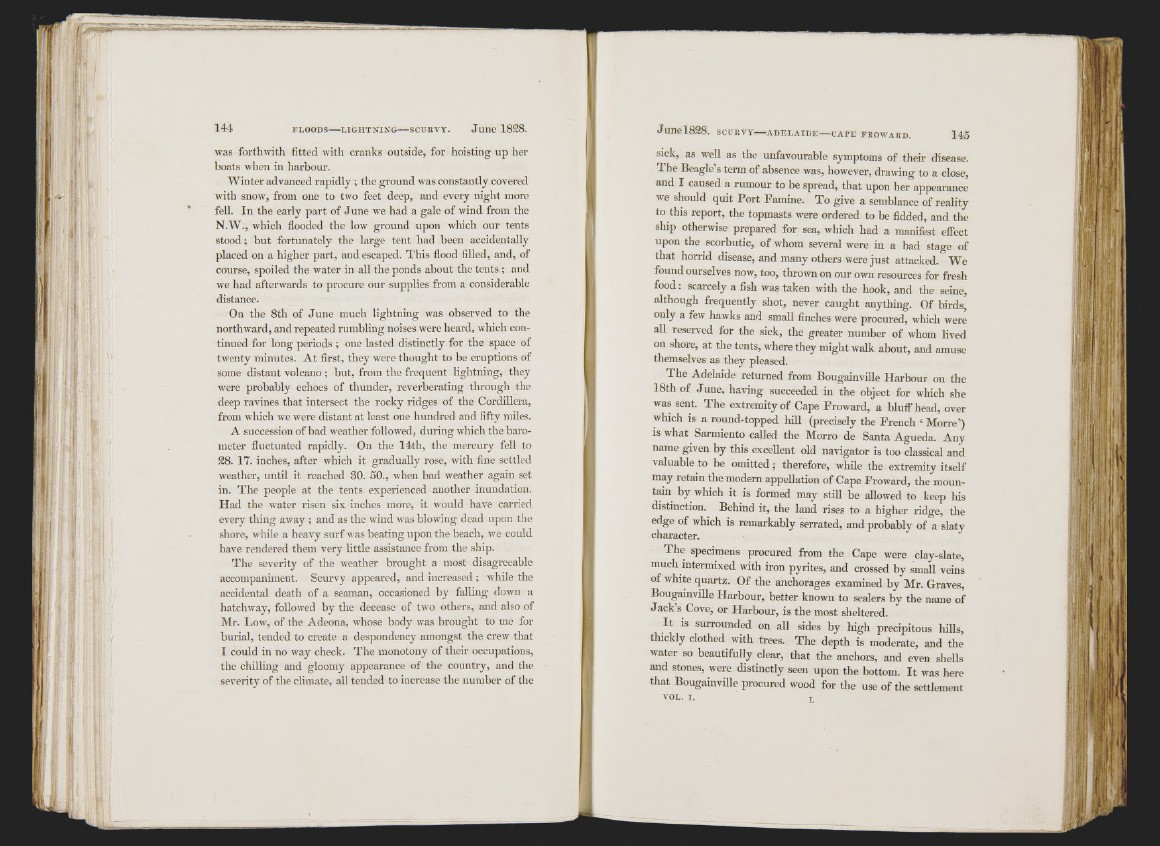
‘ i ’' I
144 FLOODS— L IG H T N IN G SCURVY. Julie 1828.
was forthwith fitted with cranks outside, for hoisting up her
boats when in harbour.
Winter advanced rapidly ; the ground was constantly covered
with snow, from one to two feet deep, and every night more
fell. In the early part of June we had a gale of wind from the
N.W., which flooded the low ground upon which our tents
stood; but fortunately the large tent had been accidentally
placed on a higher part, and escaped. This flood filled, and, of
course, spoiled the water in all the ponds about the tents ; and
we had afterwards to procure our supplies from a considerable
distance.
On the 8th of June much lightning was observed to the
northward, and repeated rumbling noises were heard, which continued
for long periods ; one lasted distinctly for the space of
twenty minutes. At first, they were thought to be eruptions of
some distant volcano; hut, from tlie frequent lightning, they
were probably echoes of thunder, reverberating through the
deep ravines that intersect the rocky ridges of the Cordillera,
from which we were distant at least one hundred and fifty miles.
A succession of had weather followed, during which the barometer
fluctuated rapidly. On the I4th, the mercury fell to
28. 17. inches, after which it gradually rose, with fine settled
weather, until it reached 30. 50., when bad weather again set
in. The people at the tents experienced another inundation.
Had the water risen six inches more, it would have carried
every thing away ; and as the wind was blowing dead upon the
shore, while a heavy surf was beating upon the beach, we could
have rendered them very little assistance from the ship.
The severity of the weather brought a most disagreeable
accompaniment. Scurvy appeared, and increased ; while the
accidental death of a seaman, occasioned by falling down a
hatchway, followed by the decease of two others, and also of
Mr. Low, of the Adeona, whose hody was brought to me for
burial, tended to create a despondency amongst the crew that
I could in no way check. The monotony of their occupations,
the chilling and gloomy appearance of the country, and the
severity of the climate, all tended to increase tlie number of the
Ju n e l828. scurvy— Ad e l a i d e— c a p e fk owa k d . 1 4 5
sick, as well as the unfavourable symptoms of their disease.
The Beagle’s term of absence was, however, drawing to a close,
and I caused a rumour to be spread, that upon her appearance
we should quit Port Famine. To give a semblance of reality
to this report, the topmasts were ordered to be fidded, and the
ship otherwise prepared for sea, which had a manifest effect
upon the scorbutic, of whom several were in a bad stage of
that horrid disease, and many others were just attacked. We
found ourselves now, too, thrown on our own resources for fresh
food; scarcely a fish was taken with the hook, and the seine,
although frequently shot, never caught anything. Of birds,
only a few hawks and small finches were procured, which were
all reserved for the sick, the greater number of whom lived
on shore, at the tents, where they might walk about, and amuse
themselves as they pleased.
The Adelaide returned from Bougainville Harbour on the
18th of June, having succeeded in the object for which she
was sent. The extremity of Cape Froward, a bluff head, over
which is a round-topped hill (precisely the French ‘ Morre’)
is what Sarmiento called the Morro de Santa Agueda. Any
name given by this excellent old navigator is too classical and
valuable to be omitted; therefore, while the extremity itself
may retain the modern appellation of Cape Frowai-d, the mountain
by which it is formed may still be allowed to keep his
distinction. Behind it, the land rises to a higher ridge, the
edge of which is remarkably serrated, and probably of a slaty
character.
The specimens procured from the Cape were clay-slate,
much intermixed with iron pyrites, and crossed by small veins
of white quartz. Of the anchorages examined by Mr. Graves,
Bougainville Harbour, better known to sealers by the name of
Jack’s Cove, or Harbour, is the most sheltered.
It IS surrounded on all sides by high precipitous hills,
thickly clothed with trees. The depth is moderate, and the
water so beautifully clear, that the anchors, and even shells
and stones, were distinctly seen upon the bottom. It was here
that Bougainville procured wood for the use of the settlement
VOL. 1. T